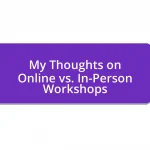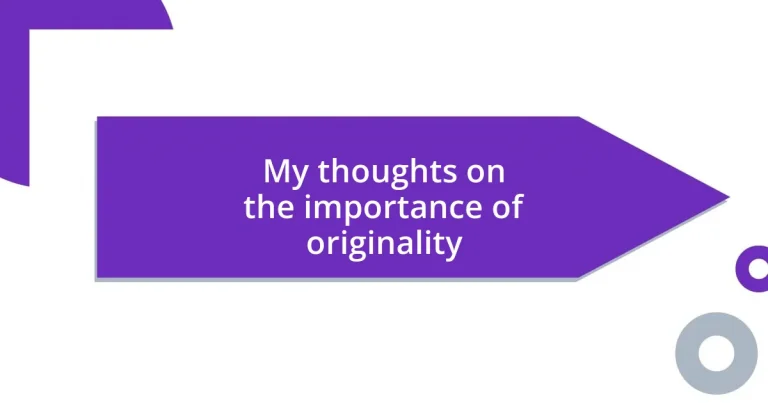Key takeaways:
- Originality stems from personal experiences and vulnerability, allowing deeper audience connections.
- Benefits of originality include personal fulfillment, standing out in a crowded field, and building a lasting legacy.
- Promoting originality in teams involves open brainstorming, encouraging diverse perspectives, and fostering a culture of experimentation.
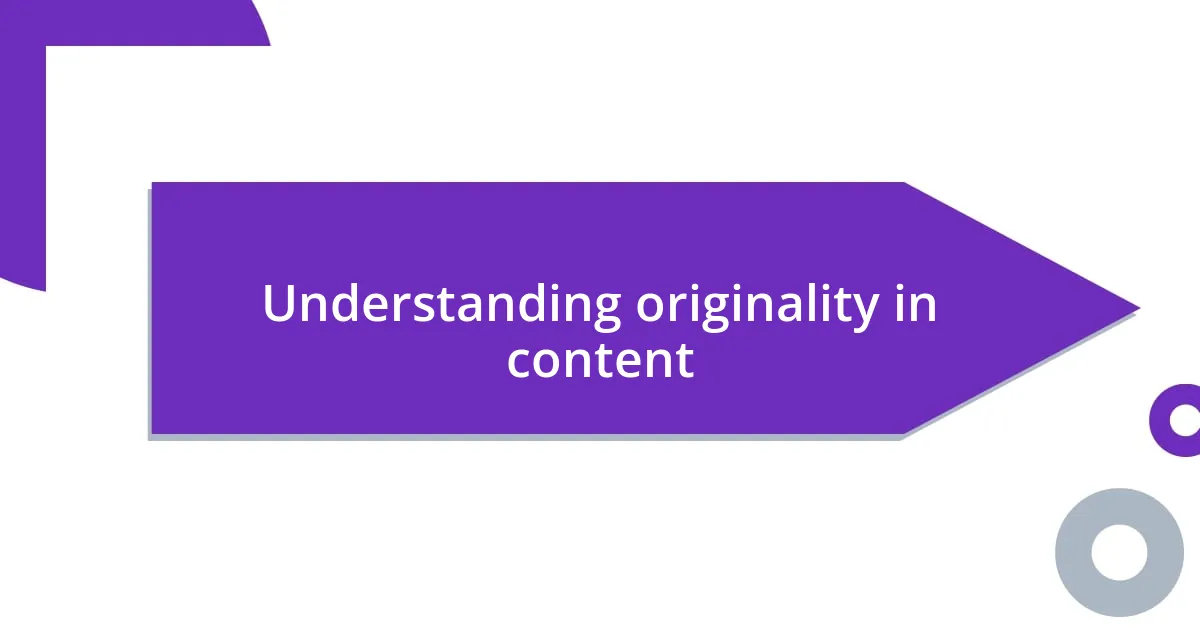
Understanding originality in content
Originality in content goes beyond just creating something new; it’s about presenting ideas in a unique perspective that reflects our individual experiences. I remember when I first started blogging, I felt pressure to emulate popular styles, but over time, I realized it wasn’t until I shared my own stories and insights that my audience truly connected with my work. Have you ever noticed how personal anecdotes can breathe life into an otherwise generic topic?
When we think of originality, we should also consider its role in building authenticity. People are drawn to realness; they crave genuine experiences that resonate with them. There was a moment when I shared a failure instead of just a success, and the feedback was overwhelming. It made me realize that vulnerability can be a cornerstone of originality.
Moreover, originality isn’t just about a singular idea; it’s about your interpretation of the world. I often ask myself: how can I add my flavor to established concepts? It’s a challenge that pushes me to constantly evolve and reflect, making originality a dynamic journey rather than a destination. What sparks your own creative thoughts?
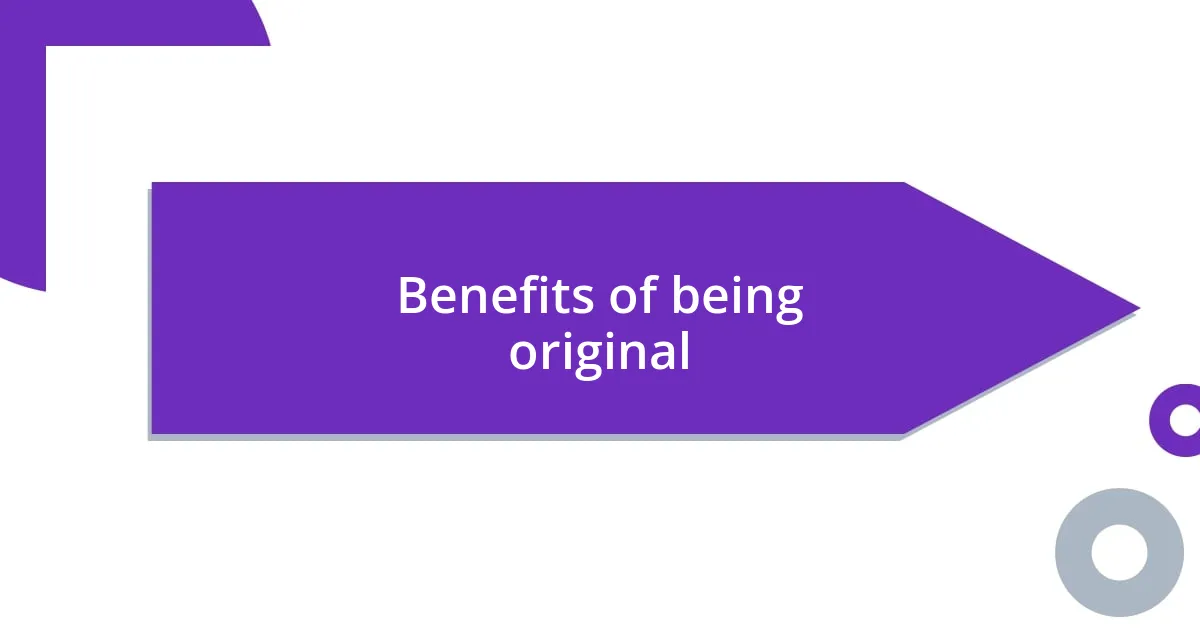
Benefits of being original
Being original opens doors to personal fulfillment. I remember when I wrote a piece that sparked a debate; it felt exhilarating. It’s empowering to express my unique voice, showing that my ideas can provoke thought and inspire conversations, rather than merely fitting into the crowd. Walking your own path can lead to unexpected connections that feel truly rewarding.
Another significant benefit of originality is the potential to stand out in a crowded landscape. Think about it: in a world flooded with similar ideas, being original is like finding a rare gem. I’ve often found that when I take a risk and showcase something distinctly “me,” the response tends to be overwhelmingly positive. It’s as if people are hungry for fresh perspectives, which further encourages creativity and reinforces the value of being myself.
Finally, originality can build a lasting legacy. I can’t help but recall conversations with mentors who emphasize that the work I do with my unique lens can inspire others long after I’m gone. Each original idea contributes to a tapestry of innovation. It’s proof that when I take the time to nurture my creativity and let it flow, I not only honor myself but also inspire future generations.
| Benefits of Being Original | Example |
|---|---|
| Personal Fulfillment | Sparking meaningful debates and connections |
| Standing Out | Receiving positive feedback when taking creative risks |
| Building a Legacy | Inspiring future generations with unique contributions |
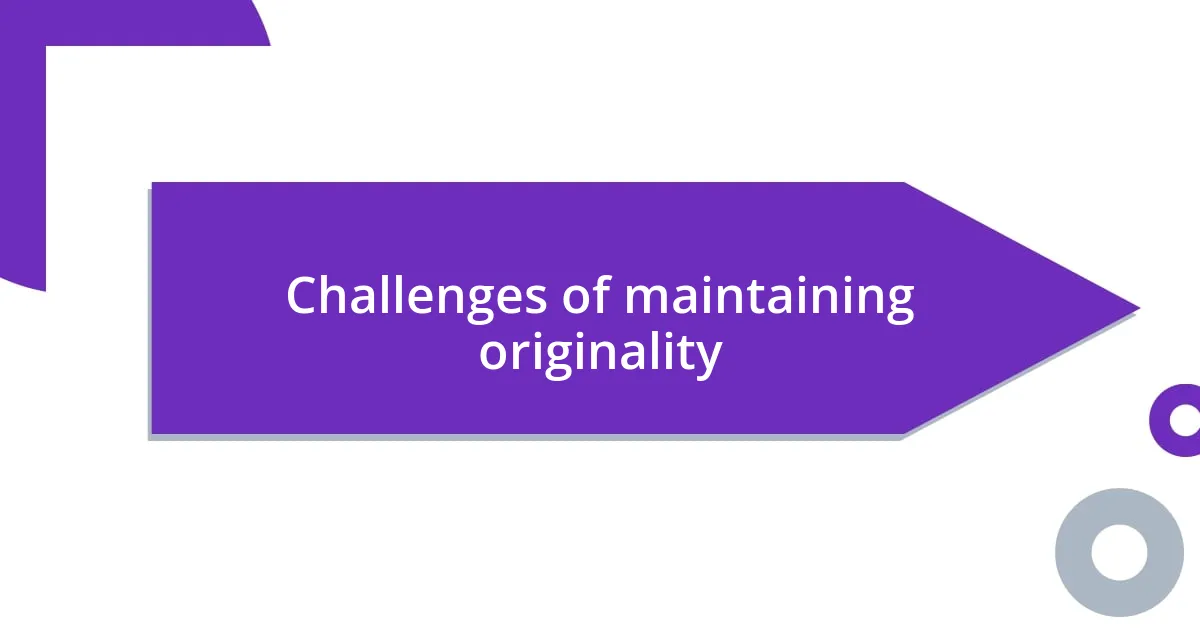
Challenges of maintaining originality
Maintaining originality can be quite a juggling act, especially with the overwhelming influence of trends and popular opinions. I often find myself torn between staying true to my voice and leaning toward what’s currently accepted. It’s easy to slip into mimicry when everyone seems to be revered for a certain style or idea. This pressure can be stifling, but I’ve learned to view it as an opportunity to carve out my own space amidst the noise.
Some key challenges I face include:
– Imposter Syndrome: Feeling that my ideas aren’t valid or worthy compared to more established voices.
– Fear of Judgment: Worrying about how others will perceive my unique take, often leading to self-censorship.
– Overexposure to Inspiration: Consuming too much content can blur the lines between inspiration and imitation, making it hard to pinpoint what’s truly mine.
Navigating these challenges is a continuous learning experience. I recall a time when I hesitated to share an unconventional idea simply because it didn’t align with mainstream narratives. But once I did, not only did I gain confidence, but I also discovered a community that resonated deeply with my perspective. It reminded me that while originality may be difficult to maintain, the rewards are often profoundly fulfilling.
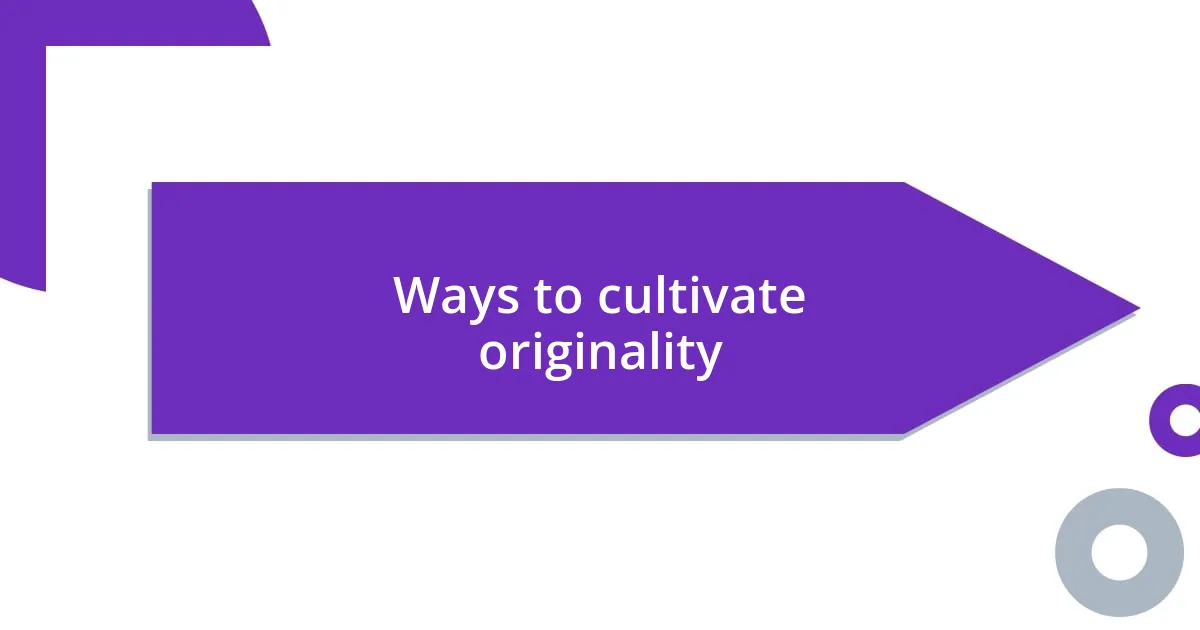
Ways to cultivate originality
To cultivate originality, I find that experimentation plays a crucial role. When I try new things—be it in writing, art, or even cooking—I’m often surprised by the innovative ideas that emerge. Have you ever discovered a hidden talent by simply stepping outside your comfort zone? That thrill of exploration not only sparks creativity but also builds confidence in trusting my unique perspective.
Another method I’ve found effective is creating a dedicated space for my thoughts. I love setting aside time in my day just for brainstorming without any filters. This practice allows my mind to wander freely, leading to unexpected insights. Sometimes, I’ll jot down seemingly random ideas, and later, I realize those “random” thoughts are actually seeds for something original. Does your creative process include moments of unstructured thinking? If not, it might be worth trying out!
Engaging with diverse influences can also deeply enrich my originality. I remember attending a workshop outside my field of expertise and walking away with a fresh viewpoint that I could apply creatively. It taught me that inspiration can come from the most unlikely sources. How often do you challenge yourself to explore new territories? Embracing variety not only broadens my horizons but encourages a richer blend of ideas that feels authentically mine.
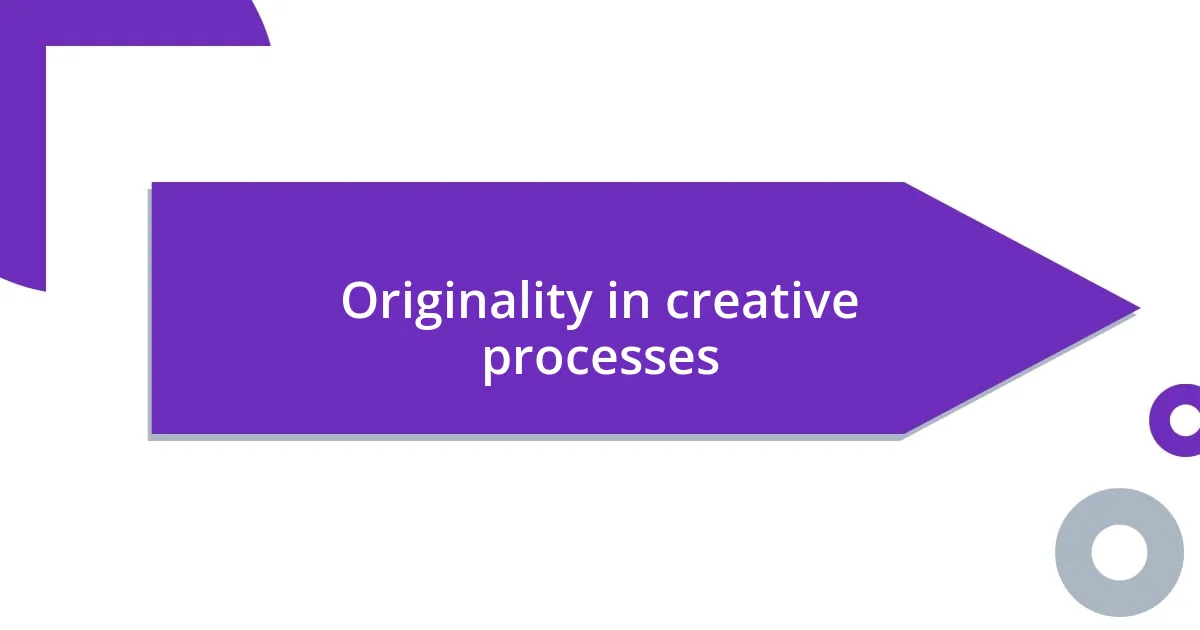
Originality in creative processes
Originality in creative processes is often sparked by those “aha” moments that come when least expected. I remember sitting in a café, doodling in my notebook, when suddenly an idea for a story hit me like a bolt of lightning. This random moment of daydreaming brought forth a unique plot twist that completely changed the direction of my work. Have you ever had a spontaneous idea while doing something mundane? Those fleeting moments can often lead to the most original outcomes.
In my experience, originality thrives in environments where the pressure to conform is low. I’ve joined groups that encourage wild brainstorming sessions, where there are no bad ideas—only possibilities. It’s liberating to be surrounded by individuals who celebrate unconventional thoughts. You might be surprised at how liberating it feels to let your imagination run wild without the shackles of critique. Isn’t it rewarding to share your unique vision with others who appreciate its value?
Moreover, I’ve noticed that original ideas often arise when I actively engage with my emotions. Writing about personal experiences can uncover layers of creativity that I hadn’t anticipated. When I pour my feelings onto the page, I find that raw authenticity shines through, setting my work apart. Have you ever noticed how something deeply personal can resonate with others? That connection makes originality not just a goal, but a journey worth taking.
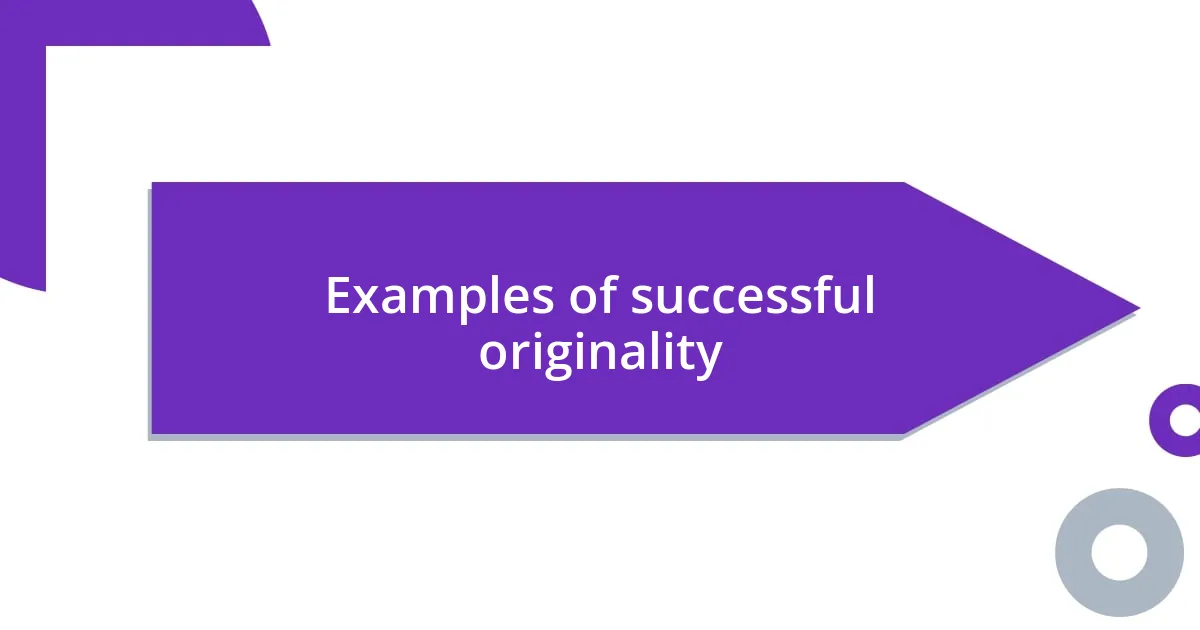
Examples of successful originality
I can think of a standout example of successful originality in the tech world—Apple’s introduction of the iPhone. When it hit the market, it wasn’t just a phone; it revolutionized the way we interact with technology. I remember how amazed I was by the combination of a user-friendly interface and sleek design. Have you ever used a product that felt so intuitive, you wondered how you ever managed without it? That innovation created a new standard in smartphones and deeply influenced countless industries.
In the realm of fashion, I can’t help but admire the boldness of Alexander McQueen. His collections often pushed the boundaries of traditional fashion, challenging societal norms and expectations. I recall the first time I saw his “Plato’s Atlantis” runway show—each piece was not just clothing but a commentary on evolution and humanity. Isn’t it fascinating how originality can provoke thought and inspire dialogue? McQueen’s work reminds me that true originality has the power to redefine and even transform the expected.
Music also thrives on originality, as seen with artists like Billie Eilish. She not only challenged the pop music status quo with her distinctive sound but also brought an authentic, raw energy that resonated with a younger audience. I remember listening to her song “Ocean Eyes” for the first time and feeling an emotional connection that was both haunting and beautiful. Have you ever encountered a song that felt like it spoke directly to you? Eilish’s originality goes beyond sound; it’s about expressing vulnerability, which creates a powerful bond between her and her listeners.
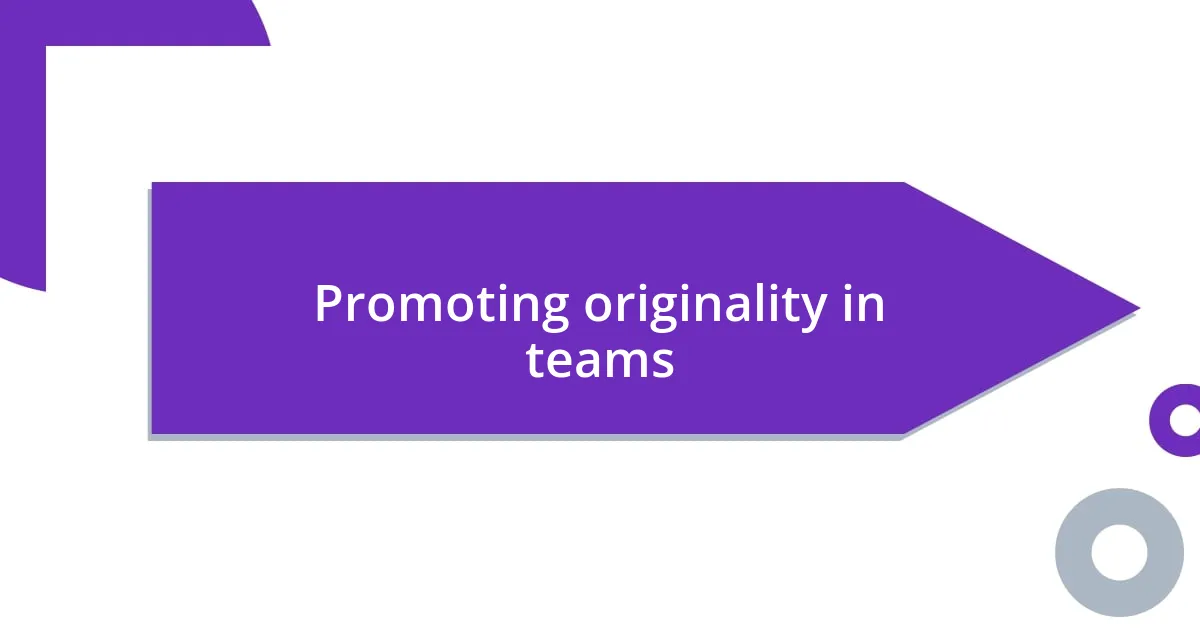
Promoting originality in teams
Promoting originality within teams can be a transformative process. I’ve found that creating an open forum for brainstorming can lead to extraordinary outcomes—like the time my colleagues and I gathered for a weekend retreat focused solely on ideation. We took turns sharing our wildest dreams without judgment, and it ultimately sparked a groundbreaking project that none of us could have conceived alone. Isn’t it fascinating how collaboration can amplify individual creativity?
Encouraging diverse perspectives is vital too. I recall a project where we intentionally mixed teams from different departments—marketing, engineering, and design—to tackle a challenge. The unique insights each person brought to the table reshaped our approach completely. Have you ever experienced that “aha” moment when someone you least expect offers a solution? It’s those unexpected viewpoints that can really foster originality.
Lastly, fostering a culture of experimentation can drive innovation. I remember a time when a colleague introduced “failure Fridays,” where we shared our unsuccessful attempts at new ideas. This practice didn’t just celebrate mistakes; it promoted courage and boldness in our creative endeavors. Isn’t it liberating to know that taking risks is part of the journey? By creating a safe space to innovate, teams can thrive in their originality, leading to groundbreaking results.




